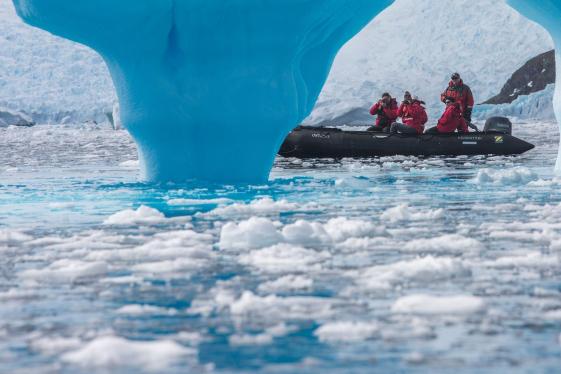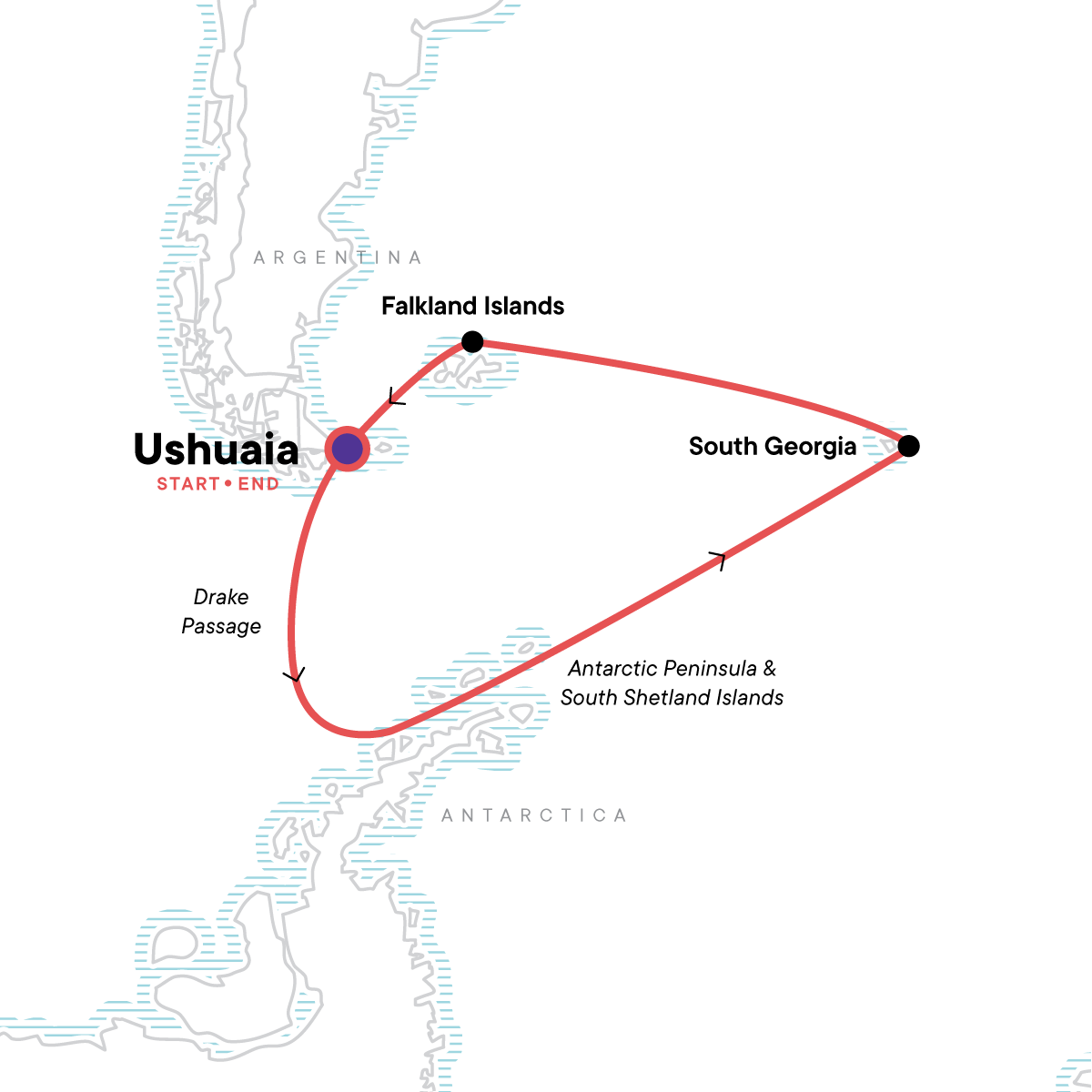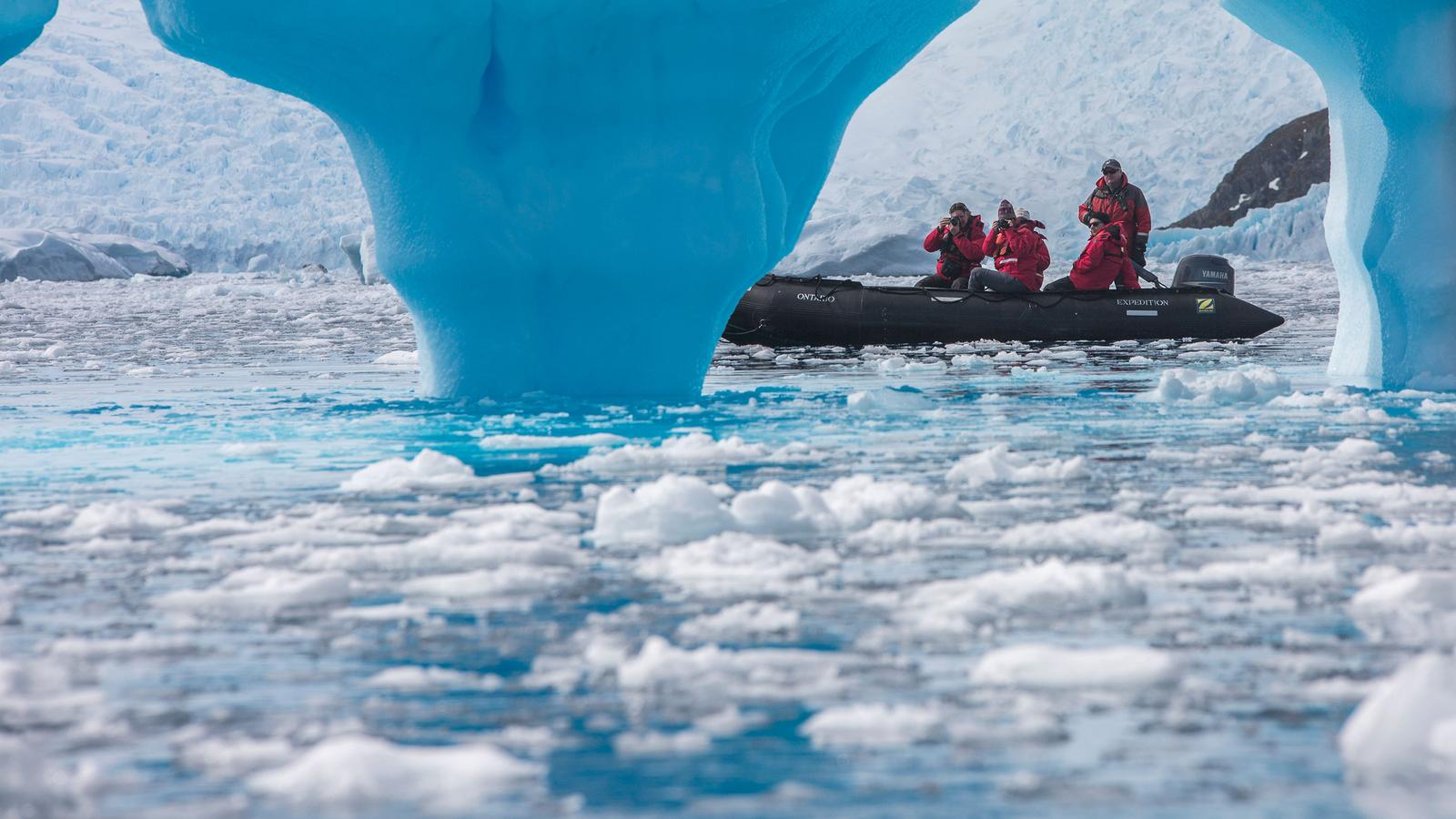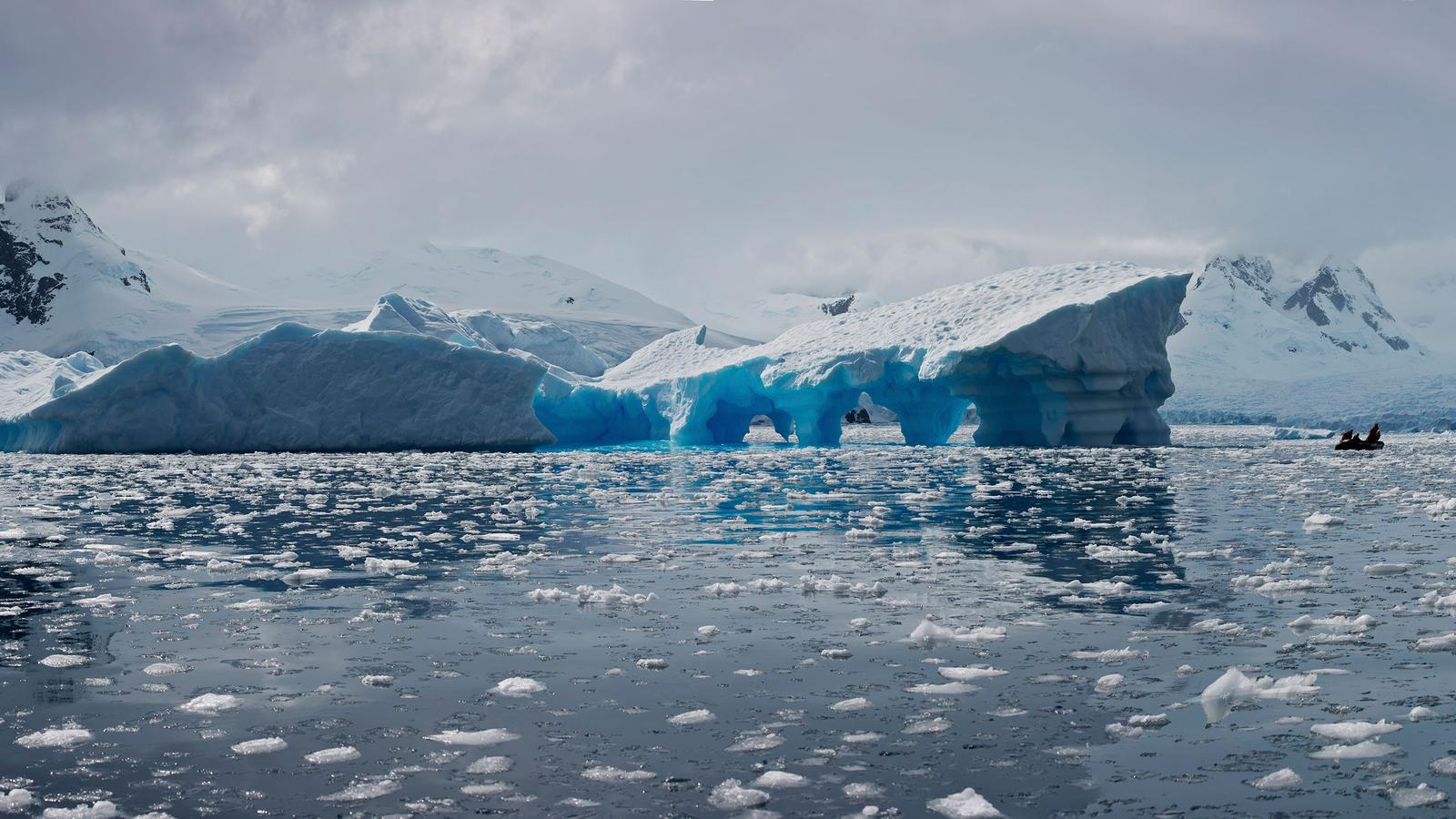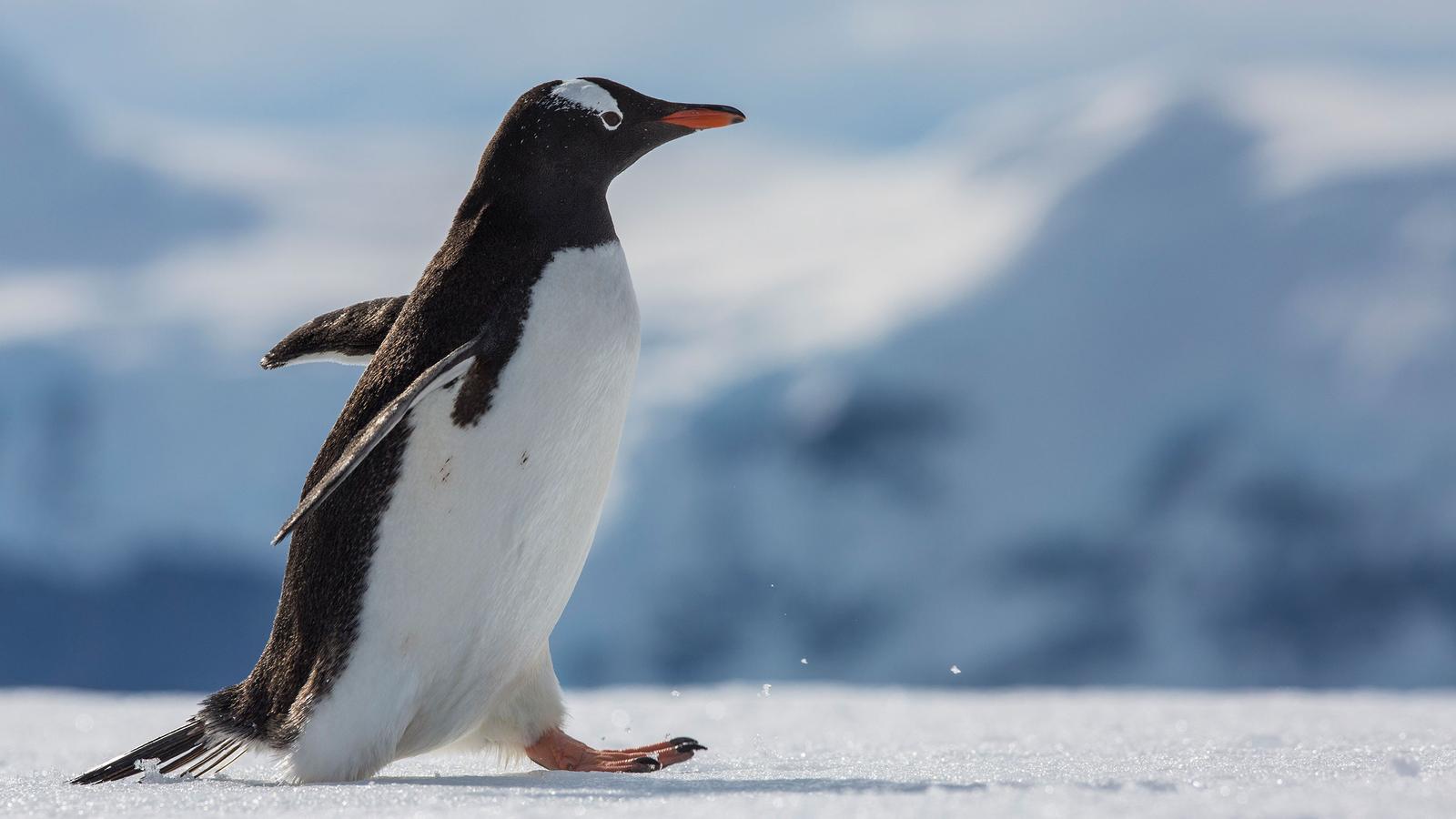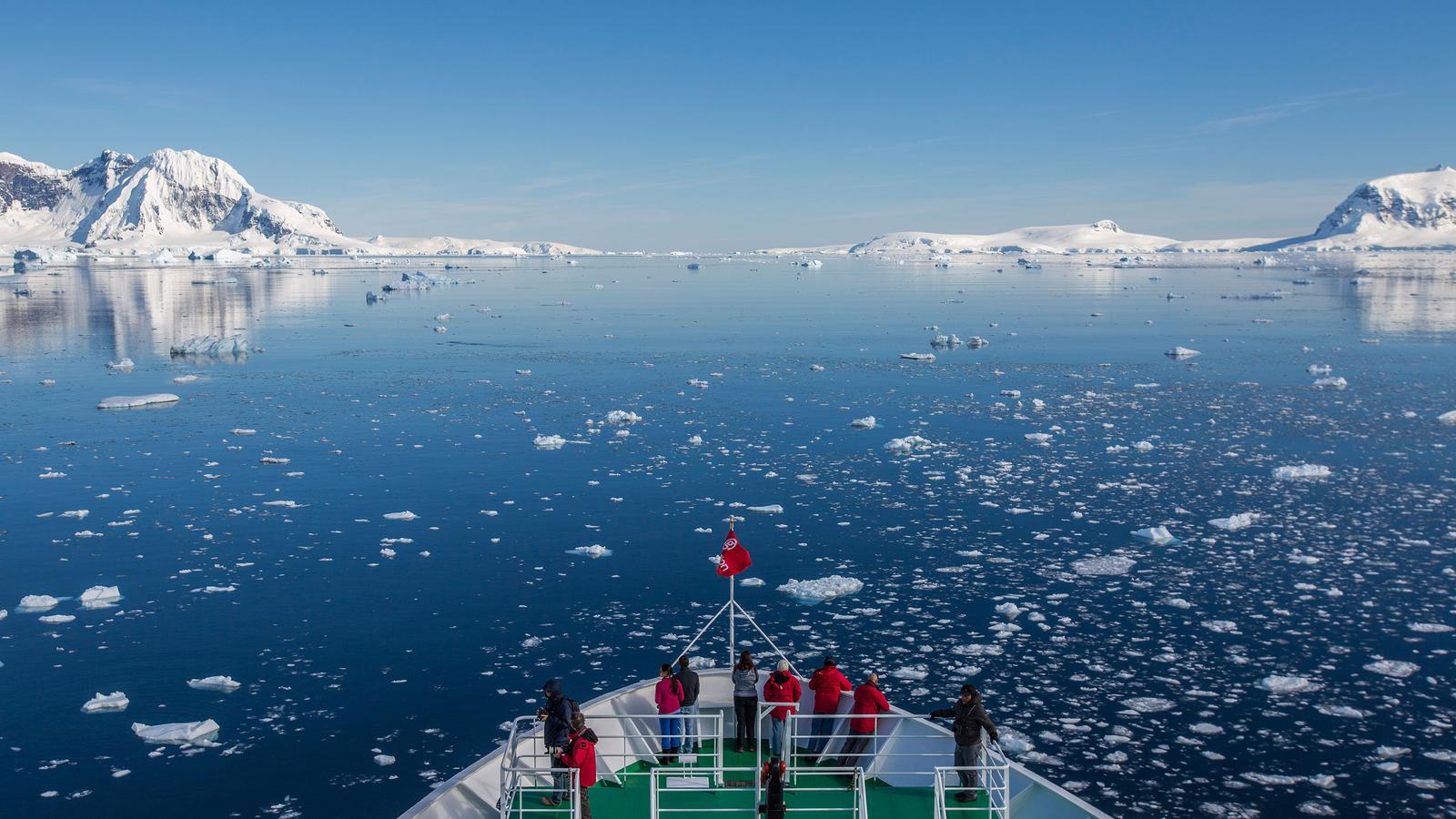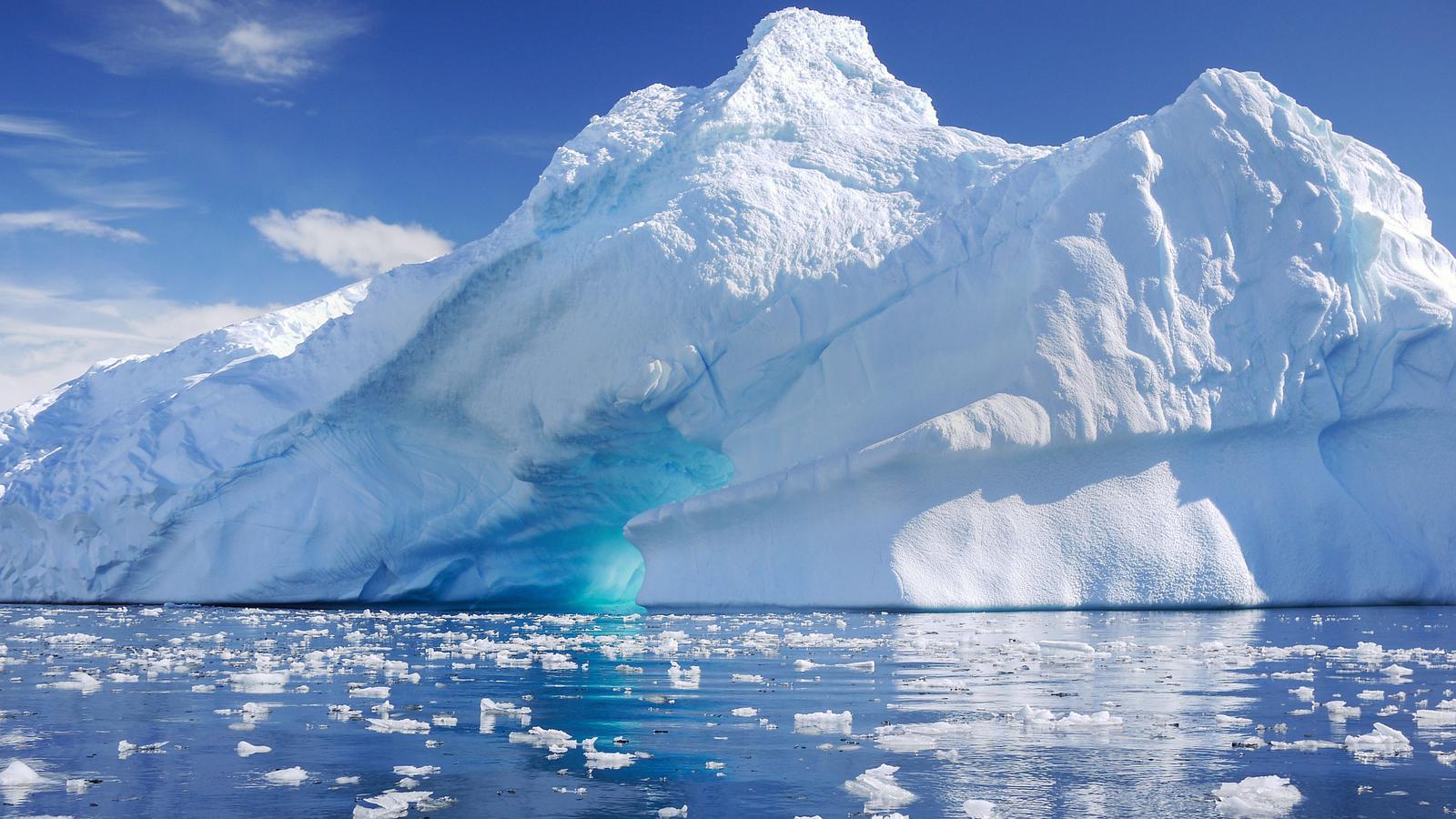Spirit of Shackleton
£14,319 was £17899
Discount: 20%
Offer end: Jul 31 2025
Duration: 21 days
Begins: Ushuaia
Ends: Ushuaia
Trip Code: XVSHSX
From
£14,319 per person
Overview
- 19 nts aboard the G Expedition
- 1 nt hotel in Ushuaia, on a twin share basis
- Arrival and departure transfers
- Zodiac excursions with our expert expedition team
- Lectures and educational programs
- Waterproof boots supplied for USA sizes 4 - 16
- Expedition parka
Twin-share hotel (1 nt), aboard the G Expedition in quad-, triple-, twin-share cabins, or suites (all with en suite bathrooms and porthole or window, 19 nts). Please note that all cabins consist of twin-size berths and are ocean-facing. Suites have one queen-size bed.
20 breakfasts, 18 lunches, 19 dinners
Allow USD25-35 for meals not included. Drinks and tips on board not included.
G Expedition, Zodiac, private bus, walking.
One expedition team member per 10 guests.
Full Itinerary
Departure Dates
Itinerary Notes
This trip is assigned a Physical Rating of 2. It is accessible to most fitness levels and for those able to do extended walks and light hiking on various terrain. It is important to note that for landings in Antarctica we use Zodiacs and wet beach landings in what sometimes can be extreme environments. This will require you to be able to safely navigate ice and snow on uneven ground, to lift your leg over the side of a Zodiac and push yourself up, walk on wet, rocky beaches and stand throughout the landing with no place to sit. Our expedition team is there to assist you if needed but having good mobility is important for your safety and enjoyment. Please also note that the G Expedition does not have an elevator and thus staircases must be used to move between decks, and depending on the weather the ship can sometimes find itself navigating rough and choppy sea conditions. For visual examples of the zodiac landings and activities please refer to the Excursions image gallery on the Expedition landing page here.
Day 1 : Ushuaia
Arrive in Ushuaia at any time. Arrival transfer included. Enjoy the sights and sounds of the world's most southerly city.
There will be a welcome desk in the lobby of the start hotel that will provide more specific information on the G Expedition and your upcoming adventure.
Please note that the first night in Ushuaia is on twin share basis. If you're travelling solo or have an odd number of travellers in your group and have not purchased a private cabin, you will be paired with another solo traveller of the same gender.
Private Vehicle
Included arrival transfer.
Acommodation
Albatros Hotel
Acommodation
Albatros Hotel
Day 2 : Ushuaia/Drake Passage
Enjoy a free morning in Ushuaia. Do any last minute shopping, explore the town, or visit the surrounding countryside. Embarkation on the G Expedition begins in the afternoon at the port in Ushuaia. Enjoy the evening sailing through the Beagle Channel.
Opt to visit the magnificent Tierra del Fuego National Park today before boarding the ship.
Expedition travel can be full of surprises! While it is our intention of adhere to the itinerary described below, there is a certain amount of flexibility built into the itinerary and on occasion it may be necessary, or desirable to make alterations. On the first day onboard, the Expedition Leader will give an expedition overview outlining what the specific plans are for the trip.
Free time:
Explore the city, do some shopping or take an optional excursion and enjoy lunch ashore.
Embarkation of the G Expedition
In the afternoon, join your fellow passengers to take your group transfer and begin your journey on the G Expedition. Please refer to your welcome letter or the joining instructions posted in the lobby of the start hotel. Make sure you have your passport handy as you are about to embark on the adventure of a lifetime.
G Expedition
Not too big, not too little, our 134-passenger polar expedition ship is just right.
Optional Activities - Day 2
Tierra del Fuego National Park Visit
Explore this stunning coastal national park extending 630 sq km. The Tierra del Fuego National Park has many different attractions, like Acigami Lake and Lapataia Bay, where the Pan-American Route ends. This is the southernmost national park of Argentina and the only one that protects mountains, sea, and forests within its limits.
Breakfast | Dinner
Day 3 : Drake Passage/South Shetland Islands
The adventure begins with an 1000km (600mi) crossing of the passage named in honour of the 16th-century English sea captain and privateer, Sir Francis Drake. Take in daily lectures from the expedition team and keep an eye out for the first sightings of icebergs, whales and albatross following in the G Expedition's wake.
The G Expedition is at home in this part of the Southern Ocean, known for the unimpeded never ending fetch of the winds that encircle the Antarctic.
As the Expedition crosses the passage there will be time to become acquainted with the ship and frequent the common areas that include the lounge, dining hall, library and lecture hall where we meet our guides, ship’s crew and expedition staff.
Begin lectures and information sessions to learn the extraordinary human and natural history of the Antarctic region.
Daily lectures and educational program
Attend lectures hosted throughout the day on everything from local wildlife to geology to history. The G Expedition has one of the highest ratios of expedition team members to guests – with one expert for every ten guests there is always someone on hand to answer questions and provide greater insight and appreciation of the world at its extremes. The expedition team is comprised of professional and highly skilled historians, marine biologists, and naturalists who offer keen insight and a unique personal perspective to each and every adventure.
G Expedition
Not too big, not too little, our 134-passenger polar expedition ship is just right.
Breakfast | Lunch | Dinner
Day 4 : Drake Passage/South Shetland Islands
The adventure begins with an 1000km (600mi) crossing of the passage named in honour of the 16th-century English sea captain and privateer, Sir Francis Drake. Take in daily lectures from the expedition team and keep an eye out for the first sightings of icebergs, whales and albatross following in the G Expedition's wake.
The G Expedition is at home in this part of the Southern Ocean, known for the unimpeded never ending fetch of the winds that encircle the Antarctic.
As the Expedition crosses the passage there will be time to become acquainted with the ship and frequent the common areas that include the lounge, dining hall, library and lecture hall where we meet our guides, ship’s crew and expedition staff.
Begin lectures and information sessions to learn the extraordinary human and natural history of the Antarctic region.
Daily lectures and educational program
Attend lectures hosted throughout the day on everything from local wildlife to geology to history. The G Expedition has one of the highest ratios of expedition team members to guests – with one expert for every ten guests there is always someone on hand to answer questions and provide greater insight and appreciation of the world at its extremes. The expedition team is comprised of professional and highly skilled historians, marine biologists, and naturalists who offer keen insight and a unique personal perspective to each and every adventure.
G Expedition
Not too big, not too little, our 134-passenger polar expedition ship is just right.
Breakfast | Lunch | Dinner
Day 5 : South Shetland Islands/Antarctic Peninsula
Experience some of the most unique wildlife and awe-inspiring scenery in the world while setting foot on the Antarctic continent. Weather and ice conditions permitting, our goal is to attempt memorable shore landings daily and encounter Gentoo, Chinstrap, and Adélie penguin rookeries; Weddell, crabeater, and leopard seals; and orca, humpback, and minke whales in the cold Antarctic waters. The peninsula also has a remarkable human history.
Welcome to the Great White Continent! Over the next few days, the Expedition will navigate southwards making stops in the South Shetland Islands then through the Bransfield Strait and to the Antarctic Peninsula.
Our goal is to attempt shore landings daily while we navigate through the area but our itinerary and daily schedule will be based on the local weather and ice conditions that we encounter.
The Antarctic Peninsula and the South Shetland Islands abound with wildlife activity. Take plenty of time to enjoy the sheer beauty and the breathtaking scenery of ice-choked waterways, blue and white icebergs, impressive glaciers and rugged snow-capped mountains.
The Peninsula also has a remarkable history and, during the voyage, opt to learn about some of the most important and dramatic expeditions to this remote corner of the world.
G Expedition
Not too big, not too little, our 134-passenger polar expedition ship is just right.
Breakfast | Lunch | Dinner
Day 6 : South Shetland Islands/Antarctic Peninsula
Experience some of the most unique wildlife and awe-inspiring scenery in the world while setting foot on the Antarctic continent. Weather and ice conditions permitting, our goal is to attempt memorable shore landings daily and encounter Gentoo, Chinstrap, and Adélie penguin rookeries; Weddell, crabeater, and leopard seals; and orca, humpback, and minke whales in the cold Antarctic waters. The peninsula also has a remarkable human history.
Welcome to the Great White Continent! Over the next few days, the Expedition will navigate southwards making stops in the South Shetland Islands then through the Bransfield Strait and to the Antarctic Peninsula.
Our goal is to attempt shore landings daily while we navigate through the area but our itinerary and daily schedule will be based on the local weather and ice conditions that we encounter.
The Antarctic Peninsula and the South Shetland Islands abound with wildlife activity. Take plenty of time to enjoy the sheer beauty and the breathtaking scenery of ice-choked waterways, blue and white icebergs, impressive glaciers and rugged snow-capped mountains.
The Peninsula also has a remarkable history and, during the voyage, opt to learn about some of the most important and dramatic expeditions to this remote corner of the world.
G Expedition
Not too big, not too little, our 134-passenger polar expedition ship is just right.
Breakfast | Lunch | Dinner
Day 7 : South Shetland Islands/Antarctic Peninsula
Experience some of the most unique wildlife and awe-inspiring scenery in the world while setting foot on the Antarctic continent. Weather and ice conditions permitting, our goal is to attempt memorable shore landings daily and encounter Gentoo, Chinstrap, and Adélie penguin rookeries; Weddell, crabeater, and leopard seals; and orca, humpback, and minke whales in the cold Antarctic waters. The peninsula also has a remarkable human history.
Welcome to the Great White Continent! Over the next few days, the Expedition will navigate southwards making stops in the South Shetland Islands then through the Bransfield Strait and to the Antarctic Peninsula.
Our goal is to attempt shore landings daily while we navigate through the area but our itinerary and daily schedule will be based on the local weather and ice conditions that we encounter.
The Antarctic Peninsula and the South Shetland Islands abound with wildlife activity. Take plenty of time to enjoy the sheer beauty and the breathtaking scenery of ice-choked waterways, blue and white icebergs, impressive glaciers and rugged snow-capped mountains.
The Peninsula also has a remarkable history and, during the voyage, opt to learn about some of the most important and dramatic expeditions to this remote corner of the world.
G Expedition
Not too big, not too little, our 134-passenger polar expedition ship is just right.
Breakfast | Lunch | Dinner
Day 8 : South Shetland Islands/Antarctic Peninsula
Experience some of the most unique wildlife and awe-inspiring scenery in the world while setting foot on the Antarctic continent. Weather and ice conditions permitting, our goal is to attempt memorable shore landings daily and encounter Gentoo, Chinstrap, and Adélie penguin rookeries; Weddell, crabeater, and leopard seals; and orca, humpback, and minke whales in the cold Antarctic waters. The peninsula also has a remarkable human history.
Welcome to the Great White Continent! Over the next few days, the Expedition will navigate southwards making stops in the South Shetland Islands then through the Bransfield Strait and to the Antarctic Peninsula.
Our goal is to attempt shore landings daily while we navigate through the area but our itinerary and daily schedule will be based on the local weather and ice conditions that we encounter.
The Antarctic Peninsula and the South Shetland Islands abound with wildlife activity. Take plenty of time to enjoy the sheer beauty and the breathtaking scenery of ice-choked waterways, blue and white icebergs, impressive glaciers and rugged snow-capped mountains.
The Peninsula also has a remarkable history and, during the voyage, opt to learn about some of the most important and dramatic expeditions to this remote corner of the world.
G Expedition
Not too big, not too little, our 134-passenger polar expedition ship is just right.
Breakfast | Lunch | Dinner
Day 9 : South Shetland Islands/Antarctic Peninsula
Experience some of the most unique wildlife and awe-inspiring scenery in the world while setting foot on the Antarctic continent. Weather and ice conditions permitting, our goal is to attempt memorable shore landings daily and encounter Gentoo, Chinstrap, and Adélie penguin rookeries; Weddell, crabeater, and leopard seals; and orca, humpback, and minke whales in the cold Antarctic waters. The peninsula also has a remarkable human history.
Welcome to the Great White Continent! Over the next few days, the Expedition will navigate southwards making stops in the South Shetland Islands then through the Bransfield Strait and to the Antarctic Peninsula.
Our goal is to attempt shore landings daily while we navigate through the area but our itinerary and daily schedule will be based on the local weather and ice conditions that we encounter.
The Antarctic Peninsula and the South Shetland Islands abound with wildlife activity. Take plenty of time to enjoy the sheer beauty and the breathtaking scenery of ice-choked waterways, blue and white icebergs, impressive glaciers and rugged snow-capped mountains.
The Peninsula also has a remarkable history and, during the voyage, opt to learn about some of the most important and dramatic expeditions to this remote corner of the world.
G Expedition
Not too big, not too little, our 134-passenger polar expedition ship is just right.
Breakfast | Lunch | Dinner
Day 10 : Antarctic Peninsula/Scotia Sea
Sail for two days, retracing Shackleton's route from Elephant Island and the Antarctic Peninsula towards South Georgia.
These waters are rich with nutrients and the long summer days provide the ingredient that is missing most of the year. The result is a complex food chain topped by several species of whales, seals, and seabirds.
Daily lectures and educational program
Attend lectures hosted throughout the day on everything from local wildlife to geology to history. The G Expedition has one of the highest ratios of expedition team members to guests – with one expert for every ten guests there is always someone on hand to answer questions and provide greater insight and appreciation of the world at its extremes. The expedition team is comprised of professional and highly skilled historians, marine biologists, and naturalists who offer keen insight and a unique personal perspective to each and every adventure.
G Expedition
Not too big, not too little, our 134-passenger polar expedition ship is just right.
Breakfast | Lunch | Dinner
Day 11 : Antarctic Peninsula/Scotia Sea
Sail for two days, retracing Shackleton's route from Elephant Island and the Antarctic Peninsula towards South Georgia.
These waters are rich with nutrients and the long summer days provide the ingredient that is missing most of the year. The result is a complex food chain topped by several species of whales, seals, and seabirds.
Daily lectures and educational program
Attend lectures hosted throughout the day on everything from local wildlife to geology to history. The G Expedition has one of the highest ratios of expedition team members to guests – with one expert for every ten guests there is always someone on hand to answer questions and provide greater insight and appreciation of the world at its extremes. The expedition team is comprised of professional and highly skilled historians, marine biologists, and naturalists who offer keen insight and a unique personal perspective to each and every adventure.
G Expedition
Not too big, not too little, our 134-passenger polar expedition ship is just right.
Breakfast | Lunch | Dinner
Day 12 : Scotia Sea/South Georgia
Home to many interesting sights (including the grave of polar explorer Ernest Shackleton), South Georgia has several former whaling stations and boasts plenty of wildlife. Visiting a huge colony of king penguins is a major highlight of this part of the journey. Weather permitting, spend four full days exploring the island.
Weather permitting, four full days will be spent exploring this island. On nearby islands look out for the wandering albatross in their nesting grounds.
G Expedition
Not too big, not too little, our 134-passenger polar expedition ship is just right.
South Georgia Island Exploration
Spend four days exploring South Georgia Island if weather permits. Observe a large colony of King penguins, the second largest species of penguin that stand almost 100cm (3 ft) tall. Nearby islands are the nesting grounds for Wandering albatross, a species of albatross that only stays on land to breed and eat. Hopefully in the four days in the area the group will get a chance to spot one of these majestic sea birds during the small amount of time it spends on land. South Georgia is also the best place in the world to observe the southern elephant seal, the largest breed of seal. The island is home to over half of the world's population of these animals. October is a great time to see newly birthed pups alongside their mothers.
Optional Activities - Day 12
South Georgia Heritage Trust
South Georgia is an island known for its rich diversity of wildlife and historical significance. It is a breeding ground for Antarctic fur and elephant seals, albatross, and petrels. It is also home to South Georgia pipits, pintails, and some of the world’s largest colonies of king penguins. With our partners, Friends of South Georgia Island and South Georgia Heritage Trust, Planeterra has invested over $150,000 CAD into a four-year habitat preservation program, where over 12,800 hectares have been cleared of invasive species, helping the local flora and fauna flourish. Depending on weather conditions, some cruises may visit the South Georgia Museum in Grytviken, where proceeds from volunteer-run tours and the gift shop help fund the conservation work to keep the island invasive-species free.
Breakfast | Lunch | Dinner
Day 13 : Scotia Sea/South Georgia
Home to many interesting sights (including the grave of polar explorer Ernest Shackleton), South Georgia has several former whaling stations and boasts plenty of wildlife. Visiting a huge colony of king penguins is a major highlight of this part of the journey. Weather permitting, spend four full days exploring the island.
Weather permitting, four full days will be spent exploring this island. On nearby islands look out for the wandering albatross in their nesting grounds.
G Expedition
Not too big, not too little, our 134-passenger polar expedition ship is just right.
South Georgia Island Exploration
Spend four days exploring South Georgia Island if weather permits. Observe a large colony of King penguins, the second largest species of penguin that stand almost 100cm (3 ft) tall. Nearby islands are the nesting grounds for Wandering albatross, a species of albatross that only stays on land to breed and eat. Hopefully in the four days in the area the group will get a chance to spot one of these majestic sea birds during the small amount of time it spends on land. South Georgia is also the best place in the world to observe the southern elephant seal, the largest breed of seal. The island is home to over half of the world's population of these animals. October is a great time to see newly birthed pups alongside their mothers.
Optional Activities - Day 13
South Georgia Heritage Trust
South Georgia is an island known for its rich diversity of wildlife and historical significance. It is a breeding ground for Antarctic fur and elephant seals, albatross, and petrels. It is also home to South Georgia pipits, pintails, and some of the world’s largest colonies of king penguins. With our partners, Friends of South Georgia Island and South Georgia Heritage Trust, Planeterra has invested over $150,000 CAD into a four-year habitat preservation program, where over 12,800 hectares have been cleared of invasive species, helping the local flora and fauna flourish. Depending on weather conditions, some cruises may visit the South Georgia Museum in Grytviken, where proceeds from volunteer-run tours and the gift shop help fund the conservation work to keep the island invasive-species free.
Breakfast | Lunch | Dinner
Day 14 : Scotia Sea/South Georgia
Home to many interesting sights (including the grave of polar explorer Ernest Shackleton), South Georgia has several former whaling stations and boasts plenty of wildlife. Visiting a huge colony of king penguins is a major highlight of this part of the journey. Weather permitting, spend four full days exploring the island.
Weather permitting, four full days will be spent exploring this island. On nearby islands look out for the wandering albatross in their nesting grounds.
G Expedition
Not too big, not too little, our 134-passenger polar expedition ship is just right.
South Georgia Island Exploration
Spend four days exploring South Georgia Island if weather permits. Observe a large colony of King penguins, the second largest species of penguin that stand almost 100cm (3 ft) tall. Nearby islands are the nesting grounds for Wandering albatross, a species of albatross that only stays on land to breed and eat. Hopefully in the four days in the area the group will get a chance to spot one of these majestic sea birds during the small amount of time it spends on land. South Georgia is also the best place in the world to observe the southern elephant seal, the largest breed of seal. The island is home to over half of the world's population of these animals. October is a great time to see newly birthed pups alongside their mothers.
Optional Activities - Day 14
South Georgia Heritage Trust
South Georgia is an island known for its rich diversity of wildlife and historical significance. It is a breeding ground for Antarctic fur and elephant seals, albatross, and petrels. It is also home to South Georgia pipits, pintails, and some of the world’s largest colonies of king penguins. With our partners, Friends of South Georgia Island and South Georgia Heritage Trust, Planeterra has invested over $150,000 CAD into a four-year habitat preservation program, where over 12,800 hectares have been cleared of invasive species, helping the local flora and fauna flourish. Depending on weather conditions, some cruises may visit the South Georgia Museum in Grytviken, where proceeds from volunteer-run tours and the gift shop help fund the conservation work to keep the island invasive-species free.
Breakfast | Lunch | Dinner
Day 15 : Scotia Sea/South Georgia
Home to many interesting sights (including the grave of polar explorer Ernest Shackleton), South Georgia has several former whaling stations and boasts plenty of wildlife. Visiting a huge colony of king penguins is a major highlight of this part of the journey. Weather permitting, spend four full days exploring the island.
Weather permitting, four full days will be spent exploring this island. On nearby islands look out for the wandering albatross in their nesting grounds.
G Expedition
Not too big, not too little, our 134-passenger polar expedition ship is just right.
South Georgia Island Exploration
Spend four days exploring South Georgia Island if weather permits. Observe a large colony of King penguins, the second largest species of penguin that stand almost 100cm (3 ft) tall. Nearby islands are the nesting grounds for Wandering albatross, a species of albatross that only stays on land to breed and eat. Hopefully in the four days in the area the group will get a chance to spot one of these majestic sea birds during the small amount of time it spends on land. South Georgia is also the best place in the world to observe the southern elephant seal, the largest breed of seal. The island is home to over half of the world's population of these animals. October is a great time to see newly birthed pups alongside their mothers.
Optional Activities - Day 15
South Georgia Heritage Trust
South Georgia is an island known for its rich diversity of wildlife and historical significance. It is a breeding ground for Antarctic fur and elephant seals, albatross, and petrels. It is also home to South Georgia pipits, pintails, and some of the world’s largest colonies of king penguins. With our partners, Friends of South Georgia Island and South Georgia Heritage Trust, Planeterra has invested over $150,000 CAD into a four-year habitat preservation program, where over 12,800 hectares have been cleared of invasive species, helping the local flora and fauna flourish. Depending on weather conditions, some cruises may visit the South Georgia Museum in Grytviken, where proceeds from volunteer-run tours and the gift shop help fund the conservation work to keep the island invasive-species free.
Breakfast | Lunch | Dinner
Day 16 : South Georgia/Southern Ocean
Sailing west, set course for the Falkland Islands. Days at sea are filled with lectures to prepare for landings. Watch for the many whales that inhabit these waters.
G Expedition
Not too big, not too little, our 134-passenger polar expedition ship is just right.
Daily lectures and educational program
Attend lectures hosted throughout the day on everything from local wildlife to geology to history. The G Expedition has one of the highest ratios of expedition team members to guests – with one expert for every ten guests there is always someone on hand to answer questions and provide greater insight and appreciation of the world at its extremes. The expedition team is comprised of professional and highly skilled historians, marine biologists, and naturalists who offer keen insight and a unique personal perspective to each and every adventure.
Breakfast | Lunch | Dinner
Day 17 : South Georgia/Southern Ocean
Sailing west, set course for the Falkland Islands. Days at sea are filled with lectures to prepare for landings. Watch for the many whales that inhabit these waters.
G Expedition
Not too big, not too little, our 134-passenger polar expedition ship is just right.
Daily lectures and educational program
Attend lectures hosted throughout the day on everything from local wildlife to geology to history. The G Expedition has one of the highest ratios of expedition team members to guests – with one expert for every ten guests there is always someone on hand to answer questions and provide greater insight and appreciation of the world at its extremes. The expedition team is comprised of professional and highly skilled historians, marine biologists, and naturalists who offer keen insight and a unique personal perspective to each and every adventure.
Breakfast | Lunch | Dinner
Day 18 : Southern Ocean/Falkland Islands (Islas Malvinas)
The Falkland Islands provide a rare opportunity to witness the biological diversity and extraordinary scenery of the southern islands. Penguins are abundant here, and the Falklands have the largest black-browed albatross colony in the world. In Stanley, meet the hardy local inhabitants whose colourful houses provide contrast to the long, dark winters.
Enjoy the last opportunity to see penguins, including the Magellanic, rockhopper, gentoo, and king penguins. With a little luck, spot elephant seals, sea lions, king cormorants, black-browed albatross, skuas, night herons, giant petrels, striated caracaras and of course sheep.
G Expedition
Not too big, not too little, our 134-passenger polar expedition ship is just right.
Visit with Stanley Locals
Stop at Port Stanley for an opportunity to meet the hardy local inhabitants whose colourful houses provide contrast to the long dark winters. The town is the capital of the Falkland Islands, most locals head to Stanley to do their shopping, visit the post office, or go golfing. The bomb disposal unit from the Falklands War in 1982 is also in the town as well as several war museums.
Breakfast | Lunch | Dinner
Day 19 : Southern Ocean/Falkland Islands (Islas Malvinas)
The Falkland Islands provide a rare opportunity to witness the biological diversity and extraordinary scenery of the southern islands. Penguins are abundant here, and the Falklands have the largest black-browed albatross colony in the world. In Stanley, meet the hardy local inhabitants whose colourful houses provide contrast to the long, dark winters.
Enjoy the last opportunity to see penguins, including the Magellanic, rockhopper, gentoo, and king penguins. With a little luck, spot elephant seals, sea lions, king cormorants, black-browed albatross, skuas, night herons, giant petrels, striated caracaras and of course sheep.
G Expedition
Not too big, not too little, our 134-passenger polar expedition ship is just right.
Visit with Stanley Locals
Stop at Port Stanley for an opportunity to meet the hardy local inhabitants whose colourful houses provide contrast to the long dark winters. The town is the capital of the Falkland Islands, most locals head to Stanley to do their shopping, visit the post office, or go golfing. The bomb disposal unit from the Falklands War in 1982 is also in the town as well as several war museums.
Breakfast | Lunch | Dinner
Day 20 : Falkland Islands/Beagle Channel/Ushuaia
Reflect on a memorable adventure and take in some final lectures en route back to Ushuaia.
Begin the journey to the home port of Ushuaia. Review the highlights of the Antarctic experience with the lecturers and staff.
G Expedition
Not too big, not too little, our 134-passenger polar expedition ship is just right.
Daily lectures and educational program
Attend lectures hosted throughout the day on everything from local wildlife to geology to history. The G Expedition has one of the highest ratios of expedition team members to guests – with one expert for every ten guests there is always someone on hand to answer questions and provide greater insight and appreciation of the world at its extremes. The expedition team is comprised of professional and highly skilled historians, marine biologists, and naturalists who offer keen insight and a unique personal perspective to each and every adventure.
Breakfast | Lunch | Dinner
Day 21 : Ushuaia
Disembark in the morning.
Our adventure comes to a close. Have a final breakfast on the ship before saying goodbyes before disembarking in Ushuaia in the morning.
A Departure transfer shuttle from the port to the airport is included. Please note that your departing flight should leave no earlier than 10AM.
Departure Day
Not ready to leave? Your CEO can help with travel arrangements to extend your adventure.
Breakfast
| dates start-End | Availability remaining spaces | Price Per Person | |
|---|---|---|---|
| Jan 2026 | |||
| Sun, 11 Jan - Sat, 31 Jan | 7+ available | £14,319 | Request a quote |
| Jan 2027 | |||
| Mon, 11 Jan - Sun, 31 Jan | 7+ available | £18,399 | Request a quote |

